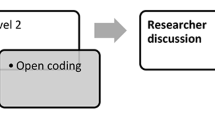Abstract
Counseling theory and practice tend to be dominated by a European-American orientation. Cross-cultural counseling is advanced as an approach that transcends European dominance while focusing on the specific needs of African American, Asian and Pacific Islander, Hispanic/Latino, and Native American cultures. This paper reviews the major conceptual models, described by social scientists, and advances a more culturally sensitive, cross-cultural approach to conceptualizing counseling theory and practice when counseling members of large minority groups living in the United States.
Similar content being viewed by others
References
American Statistical Index. (1988).Welfare Eligibility: programs treat Indian tribal trust fund payments inconsistently. American Statistical Index 26121–26230.
American Statistical Index. (1990).Refugee Resettlement Program, Report to the Congress. American Statistical Index 4694–4695.
Atkinson, D.R., Morton, G. & Sue, D.W. (1989).Counseling American minorities: A cross-cultural perspective (3rd ed.). Dubuque, IA: William C. Brown.
Benesch, H. & Ponterotto, J.G. (1989). East and west: transpersonal psychology and cross-cultural counseling.Counseling and Values 33: 121–131.
Blake, W. (1973). The influence of race of diagnosis.Smith College Studies in Social Work 43 (3): 184–192.
Casas, J.M., Ponterotto, S.G. & Gutierrez, J.M. (1986). An ethical indictment of counseling research and training: The cross-cultural perspective.Journal of Counseling and Development 64: 347–349.
Darwin, C. (1882).The Origin of Species by Means of Natural Selection: The preservation of favored races in the struggle for life (6th ed.). New York, NY: D. Appleton and company.
Darwin, C. (1896).The Descent of Man and Selection in Relation to Sex (3rd ed). New York, NY: D. Appleton and company.
Dreger, R.M. & Miller, K.S. (1960). Comparative psychological studies of Negroes and Whites in the United States.Psychological Bulletin 57: 361–402.
Dreger, R.M. & Miller, K.S. (1968). Comparative psychological studies of Negroes and Whites in the United States: 1959–1965.Psychological Bulletin 70 (3,pt.2): 1–58.
Helmuth, J. (Ed.). (1968).The culturally disadvantaged child (vol. 2). Seattle: Special Child Publications.
Herring, R.D. (1990). Nonverbal communication: A necessary component of cross-cultural counseling.Journal of Multicultural Counseling and Development 18: 172–179.
Hodges, W.L. & Spicker, H.H. (1967). The effects of preschool experiences on culturally deprived children. In W.W. Hartup & N.L. Smother-Gill (eds.),The Young Child: Reviews of Research. Washington, DC: National Association for the Education of Young Children.
Ibrahim, F.A. & Arredondo, P.M. (1986). Ethical standards for cross-cultural counseling: counselor preparation, practice, assessment, and research.Journal of Counseling and Development 64: 349–351.
Jackson, M. (1987). Cross-cultural counseling at the crossroads: a dialogue with Clemmont E. Vontress.Journal of Counseling and Development 66: 20–23.
Jensen, A.R. (1969). How much can we boost IQ and scholastic achievement?Harvard Educational Review 39 (1): 1–123.
Kiev, A. (1972).Transcultural Psychiatry. New York, NY: Free Press.
Moynihan, D.P. (1965).The Negro Family. Washington, DC: Office of Policy Planning and Research, U.S. Department of Labor.
Pedersen, P., Lonner, W.J. & Draguns, J.G. (eds.). (1976).Counseling Across Cultures. Honolulu: University Press of Hawaii.
Riessman, F. (1962).The Culturally Deprived Child. New York, NY: Harper.
Shuey, A.M. (1966).The Testing of Negro Intelligence (2nd ed.). New York, NY: Social Science Press.
Sue, D. W. (1990).Counseling the culturally different: Theory and practice (2nd ed.). New York: Wiley Press.
Sue, S. & Wagner, N. (eds.) (1973).Asian Americans: Psychological Perspectives. Ben Lomand, CA: Science and Behavior Books.
U.S. Department of Commerce. (1992, March). Bureau of the Census.1990 Census of Population and Housing: Summary Population and Housing Characteristics (CPH-1-1). Washington, DC: U.S. Government Printing Office.
Vontress, C.E. (1974). Barriers in cross-cultural counseling.Counseling and Values 18: 160–165.
Vontress, C.E. (1979). Cross-cultural counseling — existential approach.Personnel and Guidance Journal 58 (2): 117–122.
Vontress, C.E. (1988). An existential approach to cross-cultural counseling.Journal of Multicultural Counseling and Development 16: 73–83.
Westwood, M.J. & Ishiyama, F.I. (1990). The communication process as a critical intervention for client change in cross-cultural counseling.Journal of Multicultural Counseling and Development 18: 163–171.
Author information
Authors and Affiliations
Rights and permissions
About this article
Cite this article
James, W.H., Hastings, J.F. Cross-cultural counseling: A systematic approach to understanding the issues. Int J Adv Counselling 16, 319–332 (1993). https://doi.org/10.1007/BF01407917
Issue Date:
DOI: https://doi.org/10.1007/BF01407917




